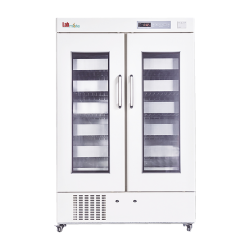
Labmate Blood Bank Refrigerator LMBL-A106 is a crucial and an explicitly designed equipment for immunohematology. It ensure the safe and appropriate storage of blood. It is also suitable for storing specific blood components. The multiple sensors present ensuring to provide the accurate temperature necessary for keeping the integrity of blood samples.
Get Quote| Capacity | 1000 L |
| Temp Range | 4 ± 1°C |
| Temp Accuracy | 0.1°C |
| Display | LED |
| Power Consumption | 513 W |
| Power | AC 110/ 220 V ±10%, 50/60 Hz |
| Casters | 4 Casters |
| Adjustable shelves | SS drawers |
| Blood Bags (450 ml) | 576 pieces |
| External Dimension | 1220 x 878 x 1885 mm |
| Gross weight | 335 kg |
 Stainless steel body and antibacterial powder coating
Stainless steel body and antibacterial powder coating
 Precise monitoring and programming
Precise monitoring and programming
 R134a refrigerant for efficient cooling effect
R134a refrigerant for efficient cooling effect
 CFC-free refrigeration
CFC-free refrigeration
 Microprocessor control system
Microprocessor control system
 LED display
LED display
 Auto Defrost
Auto Defrost
 Transparent glass door for easy observation of samples
Transparent glass door for easy observation of samples
 Forced air refrigeration for uniform temperature
Forced air refrigeration for uniform temperature
 Adjustable shelves for better utility of space
Adjustable shelves for better utility of space
 Low battery, sensor error and power failure
Low battery, sensor error and power failure
 Alarm with sound and light indicator
Alarm with sound and light indicator
 Double door to avoid the cooling loss
Double door to avoid the cooling loss
 Door ajar warning and safety lock system
Door ajar warning and safety lock system
| Temperature printer | LMBL-SA-01 |
| Probe access port | LMBL-SA-02 |
| LED Lamp | LMBL-SA-03 |
| Door key | LMBL-SA-04 |
Temperature recorder - LMBL-OA-01
Get Quote for
Blood Bank Refrigerator LMBL-A106
Related Products